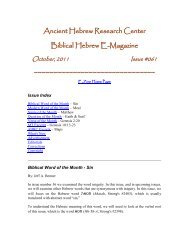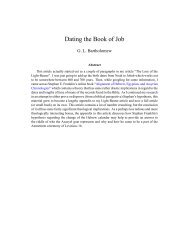My Name Forever - Ancient Hebrew Research Center
My Name Forever - Ancient Hebrew Research Center
My Name Forever - Ancient Hebrew Research Center
You also want an ePaper? Increase the reach of your titles
YUMPU automatically turns print PDFs into web optimized ePapers that Google loves.
<strong>My</strong> <strong>Name</strong> <strong>Forever</strong> 10<br />
Y’hó I vh<br />
29. When found at the beginning of someone's name, the <strong>Name</strong> is pronounced Y’hó I vh as in<br />
Y’hónatan i ,b I vh (Jonathan) in 1 Samuel 14:6 & 8. Jonathan means, “vuvh Has Given.” When it appears<br />
in the middle of a man's name the pronunciation is the same - Y’hó I vh as in El’Y’hóeinai hbhg I vh k t<br />
(Elioenai). Elioenai means, “<strong>My</strong> Eyes Are Toward vuvh.” We find this name in 1 Chronicles 26:3. As<br />
already mentioned, and as is common in modern <strong>Hebrew</strong>, the Hei v in Biblical <strong>Hebrew</strong> often vanishes.<br />
So it is that we find Y’hó I vh often shortened to Yó Ih, Thus Y’hónatan i ,b I vh becomes Yónatan i ,b Ih in<br />
1 Samuel 13:2, 3 & 22 while El’Y’hóeinai hbhg k t becomes El’Yóeinai hbhg k t in 1 Chronicles 4:36.<br />
Yáhu Uvh<br />
I vh<br />
30. When the <strong>Name</strong> appears at the end of a proper name it is pointed Yáhu Uvh as in MíkhaYáhu<br />
Uvh fh n (Michaiah) in 2 Chronicles 17:7, and EliYáhu UvH k t (Elijah) in I Kings 17. “Michaiah” means,<br />
“Who Is Like vuvh?” while Elijah means, “vuvh Is <strong>My</strong> Elohim.” This pronunciation also gets shortened.<br />
Thus EliYáhu UvH k t appears in Malachi 3:23 as EliYáh vH k t and MíkhaYáhu Uvh fh n becomes<br />
MikhaYáh vh fh n in Nehemiah 12:35.<br />
Y’hu Uvh<br />
31. There are several examples of an exception to how the <strong>Name</strong> looks at the end of proper names,<br />
but only in one name. In Judges 17 verses 1 & 4, I Kings 22:8 ff, 2 Chronicles 18:7 and Jeremiah 36:11 &<br />
13, where we would expect to find Michaiah as MíkhaYáhu Uvh fh n , we find instead MikháY’hu Uvh fh n .<br />
To my knowledge, this is the only name in which the <strong>Name</strong> is ever pointed like this.<br />
Ecclesiastes 11:3 and Sham Y’hú U vh o J<br />
32. We see three evidently related, but distinct pronunciations of the <strong>Name</strong> in the <strong>Hebrew</strong> Scriptures.<br />
How do we explain this phenomenon? Perhaps we should ask another question first: Do any of these<br />
pronunciations reflect a legitimate verbal form? With this question, we reach a critical point in our study.<br />
No longer can we simply observe the Biblical data. Now we must evaluate it. The key to a proper analysis<br />
and the answer to our question is found hidden away in the little read book of Kohelet (Ecclesiastes).<br />
There, in the eleventh chapter, is a verse which apparently has been overlooked in all the discussions<br />
about the <strong>Name</strong>. I came across it accidentally while reading the <strong>Hebrew</strong> text one day many years ago.<br />
One phrase all but shouted at me from the printed page.<br />
Ih






